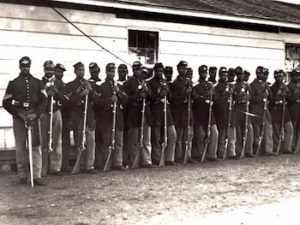
*This date marks the creation of the all-Black Fifty-fourth Massachusetts Infantry in 1863.
Robert Gould Shaw, the twenty-six-year-old member of a prominent Boston abolitionist family, organized the Fifty-fourth Massachusetts Infantry. It began in March of that year at Camp Meigs, Readville, Massachusetts. Shaw had served in the Seventh New York National Guard and the Second Massachusetts Infantry and was appointed colonel of the Fifty-fourth in February of that year by Massachusetts’s governor, John A. Andrew.
As one of the first Black units organized in the northern states, the Fifty-fourth was the object of great interest and curiosity at the time. Its performance would be considered an important indication of the possibilities surrounding the use of Blacks in combat. The regiment was composed primarily of free Blacks throughout the North, particularly in Massachusetts and Pennsylvania. Amongst its recruits were Lewis N. Douglass and Charles Douglass, sons of the famous ex-slave and abolitionist Frederick Douglass. After recruiting and training, the unit moved to the Department of the South, arriving at Hilton Head, South Carolina, on June 3, 1863. Soon after, it saw its first action at James Island.
The regiment earned its greatest fame on July 18, 1863, when it led the unsuccessful and controversial assault on the Confederate positions at Fort Wagner. In this desperate attack, the Fifty-fourth was placed on the front line, and over 250 men died. Shaw died on the crest of the enemy walls, shouting, "Forward, Fifty-fourth!" It was also on the wall of the fort that Sgt. William H. Carney, Company C, risked his life in an action for which he received the Medal of Honor. That heroic charge and Shaw’s death made the regiment a household name throughout the North and helped encourage Black recruiting. For the remainder of 1863, the unit participated in siege operations around Charleston before boarding transports for Florida early in February 1864.
The regiment numbered 510 officers and men at the opening of the Florida Campaign, and its new commander was Edward N. Hallowell, a twenty-seven-year-old merchant from Medford, Massachusetts. Anxious to avenge the Fort Wagner repulse, the Fifty-fourth was the best Black regiment available to General Seymour, the Union commander. However, only about 500 members were present at Olustee, Florida, the others having been detailed for other duties. Along with the 35th United States Colored Troops, the Fifty-fourth entered the fighting late at Olustee and helped save the Union army from complete disaster.
The Fifty-fourth marched into battle yelling, "Three cheers for Massachusetts and seven dollars a month." The latter referred to the difference in pay between white and colored Union infantry, long a sore point with colored troops. Congress passed a bill correcting this and giving colored troops equal pay. However, word of the bill would not reach these troops until after the battle of Olustee. The regiment lost eighty-six men in the battle, the lowest number of the three Black regiments.
The 54th and 35th United States Colored Troops served as the rearguard for the Union Army and possibly prevented its destruction. After Olustee, the Fifty-fourth was not sent to participate in the bloody Virginia campaigns of 1864-1865. Instead, it remained in the South, fighting in the battles of Honey Hill and Boykin’s Mill before Charleston and Savannah.
It was mustered out in August 1865. More than a century after the war, the Fifty-fourth remains the most famous Black regiment of the war, due mainly to the popularity of the movie Glory, which narrates its story before and including the attack on Fort Wagner.
Library of Congress
101 Independence Avenue S.E.
Washington D.C. 20540